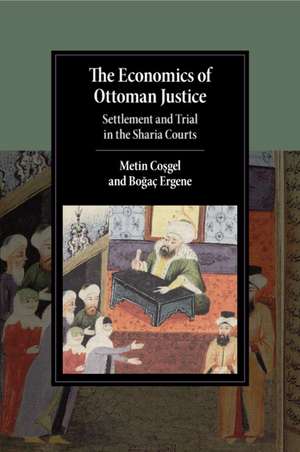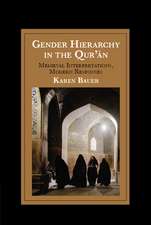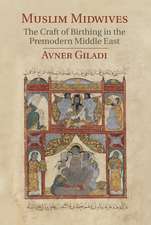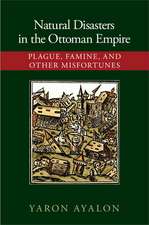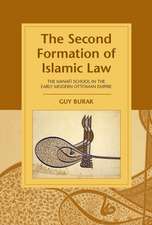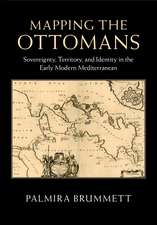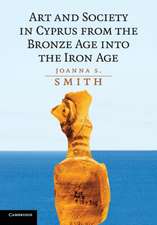The Economics of Ottoman Justice: Settlement and Trial in the Sharia Courts: Cambridge Studies in Islamic Civilization
Autor Metin Coşgel, Boğaç Ergeneen Limba Engleză Paperback – 28 noi 2018
| Toate formatele și edițiile | Preț | Express |
|---|---|---|
| Paperback (1) | 320.75 lei 6-8 săpt. | |
| Cambridge University Press – 28 noi 2018 | 320.75 lei 6-8 săpt. | |
| Hardback (1) | 564.11 lei 17-23 zile | +56.24 lei 7-13 zile |
| Cambridge University Press – 26 oct 2016 | 564.11 lei 17-23 zile | +56.24 lei 7-13 zile |
Din seria Cambridge Studies in Islamic Civilization
-
 Preț: 199.99 lei
Preț: 199.99 lei - 14%
 Preț: 768.30 lei
Preț: 768.30 lei - 11%
 Preț: 695.06 lei
Preț: 695.06 lei -
 Preț: 233.11 lei
Preț: 233.11 lei - 19%
 Preț: 564.11 lei
Preț: 564.11 lei -
 Preț: 230.14 lei
Preț: 230.14 lei -
 Preț: 289.40 lei
Preț: 289.40 lei - 9%
 Preț: 591.83 lei
Preț: 591.83 lei -
 Preț: 281.30 lei
Preț: 281.30 lei -
 Preț: 185.26 lei
Preț: 185.26 lei - 14%
 Preț: 675.82 lei
Preț: 675.82 lei -
 Preț: 243.53 lei
Preț: 243.53 lei - 14%
 Preț: 680.53 lei
Preț: 680.53 lei -
 Preț: 295.58 lei
Preț: 295.58 lei -
 Preț: 328.80 lei
Preț: 328.80 lei -
 Preț: 417.25 lei
Preț: 417.25 lei - 11%
 Preț: 693.02 lei
Preț: 693.02 lei -
 Preț: 408.37 lei
Preț: 408.37 lei -
 Preț: 284.17 lei
Preț: 284.17 lei - 14%
 Preț: 770.83 lei
Preț: 770.83 lei -
 Preț: 335.34 lei
Preț: 335.34 lei -
 Preț: 326.94 lei
Preț: 326.94 lei -
 Preț: 286.51 lei
Preț: 286.51 lei - 14%
 Preț: 677.47 lei
Preț: 677.47 lei -
 Preț: 208.30 lei
Preț: 208.30 lei - 11%
 Preț: 641.31 lei
Preț: 641.31 lei - 11%
 Preț: 604.41 lei
Preț: 604.41 lei - 11%
 Preț: 690.27 lei
Preț: 690.27 lei -
 Preț: 371.83 lei
Preț: 371.83 lei -
 Preț: 324.53 lei
Preț: 324.53 lei - 11%
 Preț: 698.50 lei
Preț: 698.50 lei -
 Preț: 375.30 lei
Preț: 375.30 lei - 11%
 Preț: 693.36 lei
Preț: 693.36 lei -
 Preț: 207.74 lei
Preț: 207.74 lei -
 Preț: 362.17 lei
Preț: 362.17 lei - 11%
 Preț: 694.38 lei
Preț: 694.38 lei - 11%
 Preț: 690.46 lei
Preț: 690.46 lei - 11%
 Preț: 691.66 lei
Preț: 691.66 lei - 11%
 Preț: 694.23 lei
Preț: 694.23 lei -
 Preț: 389.50 lei
Preț: 389.50 lei -
 Preț: 370.46 lei
Preț: 370.46 lei -
 Preț: 422.96 lei
Preț: 422.96 lei
Preț: 320.75 lei
Nou
Puncte Express: 481
Preț estimativ în valută:
61.38€ • 66.88$ • 51.72£
61.38€ • 66.88$ • 51.72£
Carte tipărită la comandă
Livrare economică 23 aprilie-07 mai
Preluare comenzi: 021 569.72.76
Specificații
ISBN-13: 9781316610275
ISBN-10: 1316610276
Pagini: 364
Ilustrații: 5 b/w illus. 63 tables
Dimensiuni: 153 x 230 x 20 mm
Greutate: 0.49 kg
Editura: Cambridge University Press
Colecția Cambridge University Press
Seria Cambridge Studies in Islamic Civilization
Locul publicării:Cambridge, United Kingdom
ISBN-10: 1316610276
Pagini: 364
Ilustrații: 5 b/w illus. 63 tables
Dimensiuni: 153 x 230 x 20 mm
Greutate: 0.49 kg
Editura: Cambridge University Press
Colecția Cambridge University Press
Seria Cambridge Studies in Islamic Civilization
Locul publicării:Cambridge, United Kingdom
Cuprins
Introduction; Part I. Methodology and Background: 1. Quantitative approaches in research on Ottoman legal practice; 2. Kastamonu: the town and its people; Part II. The Court and Court Clients: 3. The court, its actors, and its archive; 4. Court use: a preliminary analysis; Part III. To Settle or Not to Settle: 5. Dispute resolution in Ottoman courts of law; 6. Trial vs settlement: an economic approach; 7. Which disputes went to trial? Case-type- and period-based analyses; Part IV. Litigations: 8. Rules and tools of litigation; 9. Economics of litigation: what affects success at trial?; 10. Who won? Case-type- and period-based analyses; Conclusion.
Recenzii
'Metin Coşgel and Boğaç Ergene have written a well-researched book that pushes the boundary of interdisciplinary scholarship. Their history is informed by economics, and their economics is generalized via history. It is an impressive and difficult methodology to pull off, yet Coşgel and Ergene have done just this.' Jared Rubin, EH.Net
'The scholarship of Coşgel and Ergene is astonishing, deep in the archives but with salient comparisons to other parts of the Empire and the world, subtle in legal knowledge but penetrating in game theory. The book melds the intellectual values of history and of economics, practicing quantitative economic history with a humanistic sensibility. Coşgel and Ergene, indeed, pioneer a legal 'humanomic' history - economics with the people left in, legal history with the economics left in, history with all the facts left in, qualitative and quantitative.' Deirdre N. McCloskey, Distinguished Professor Emerita of Economics and of History, Professor Emerita of English and of Communication, University of Illinois at Chicago
'In this eye-opening study … the authors demonstrate the value of an interdisciplinary approach, as well as the power of the tools of economics to shed new and important light on how the legal system worked … The use of quantitative methods and models from Law-and Economics pays off richly. Anyone interested in how institutions worked in the past to enforce contracts and property rights should read this book.' Joel Mokyr, Northwestern University, author of A Culture of Growth: Origins of the Modern Economy (Princeton, 2016)
'Metin Coşgel and Boğaç Ergene masterfully combine the insights from the law and economics literature with the methods of history and quantitative analysis to study the court documents and legal practice … The result is a well written and path-breaking book.' Şevket Pamuk, Bogaziçi (Bosphorus) University, Turkey
'Using the [court records] of Kastamonu, and with singular clarity, historian Boğaç Ergene and economist Metin Coşgel have established a quantitative template for the study of the impact of status and wealth on access and resolution in the Ottoman courts of the 18th century.' Virginia H. Aksan, McMaster University
'In The Economics of Ottoman Justice, Cosgel and Ergene put Law and Economics insights to excellent use in analyzing data from an Ottoman court. Combine that with a historian's broad and deep appreciation for social and cultural context, and this book represents a model for how to do truly interdisciplinary scholarship.' Peter Siegelman, University of Connecticut Law School
'The scholarship of Coşgel and Ergene is astonishing, deep in the archives but with salient comparisons to other parts of the Empire and the world, subtle in legal knowledge but penetrating in game theory. The book melds the intellectual values of history and of economics, practicing quantitative economic history with a humanistic sensibility. Coşgel and Ergene, indeed, pioneer a legal 'humanomic' history - economics with the people left in, legal history with the economics left in, history with all the facts left in, qualitative and quantitative.' Deirdre N. McCloskey, Distinguished Professor Emerita of Economics and of History, Professor Emerita of English and of Communication, University of Illinois at Chicago
'In this eye-opening study … the authors demonstrate the value of an interdisciplinary approach, as well as the power of the tools of economics to shed new and important light on how the legal system worked … The use of quantitative methods and models from Law-and Economics pays off richly. Anyone interested in how institutions worked in the past to enforce contracts and property rights should read this book.' Joel Mokyr, Northwestern University, author of A Culture of Growth: Origins of the Modern Economy (Princeton, 2016)
'Metin Coşgel and Boğaç Ergene masterfully combine the insights from the law and economics literature with the methods of history and quantitative analysis to study the court documents and legal practice … The result is a well written and path-breaking book.' Şevket Pamuk, Bogaziçi (Bosphorus) University, Turkey
'Using the [court records] of Kastamonu, and with singular clarity, historian Boğaç Ergene and economist Metin Coşgel have established a quantitative template for the study of the impact of status and wealth on access and resolution in the Ottoman courts of the 18th century.' Virginia H. Aksan, McMaster University
'In The Economics of Ottoman Justice, Cosgel and Ergene put Law and Economics insights to excellent use in analyzing data from an Ottoman court. Combine that with a historian's broad and deep appreciation for social and cultural context, and this book represents a model for how to do truly interdisciplinary scholarship.' Peter Siegelman, University of Connecticut Law School
Notă biografică
Descriere
A systematic analysis of legal practice in a sharia court in the Ottoman Empire during the seventeenth and eighteenth centuries.
